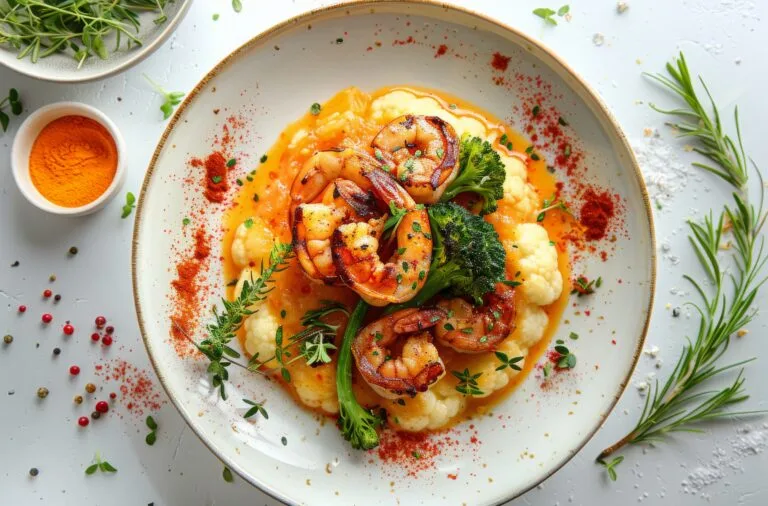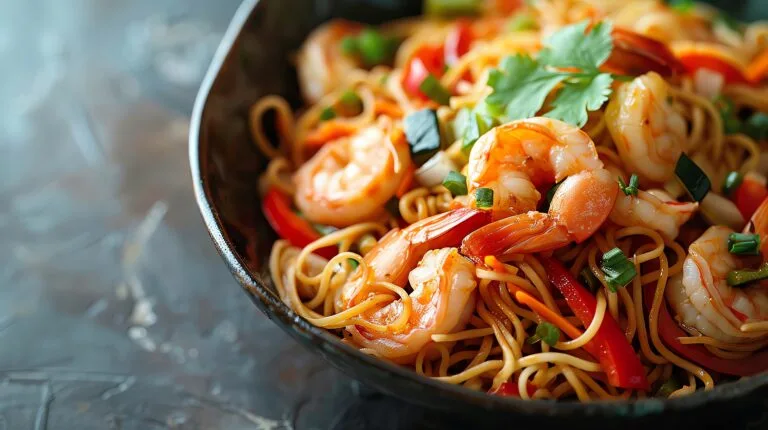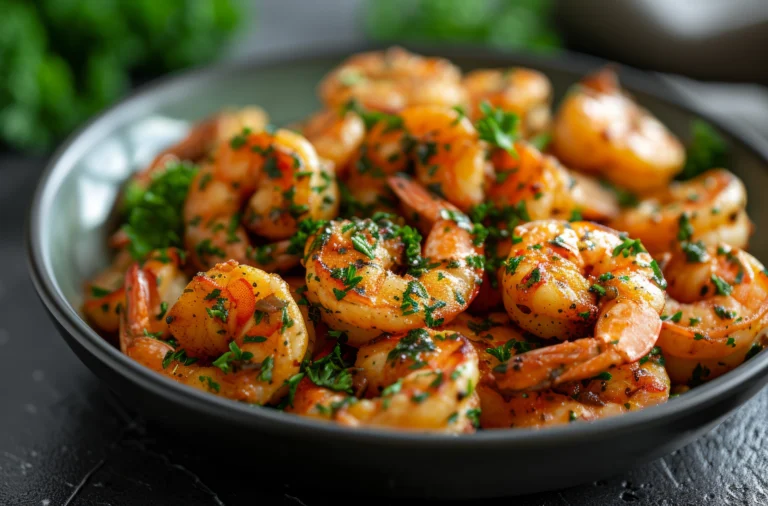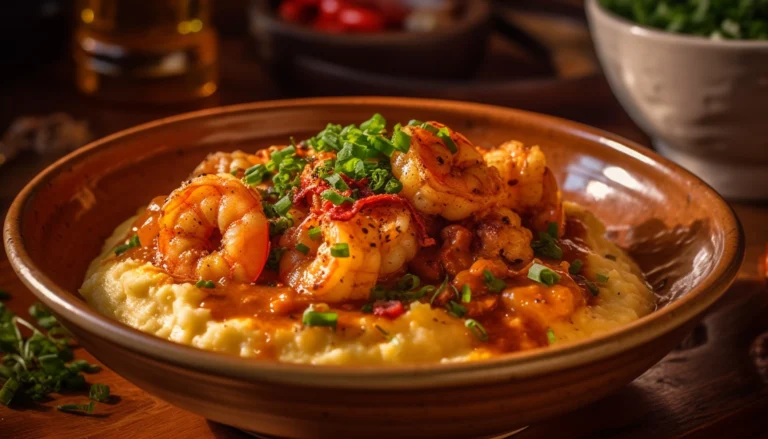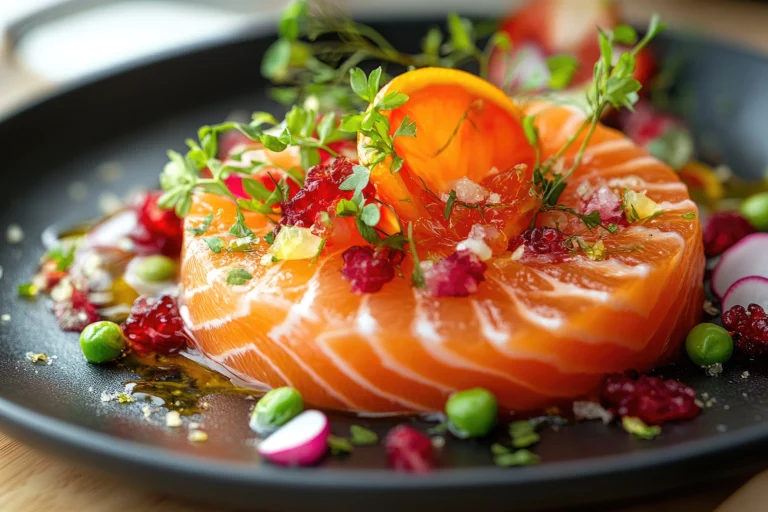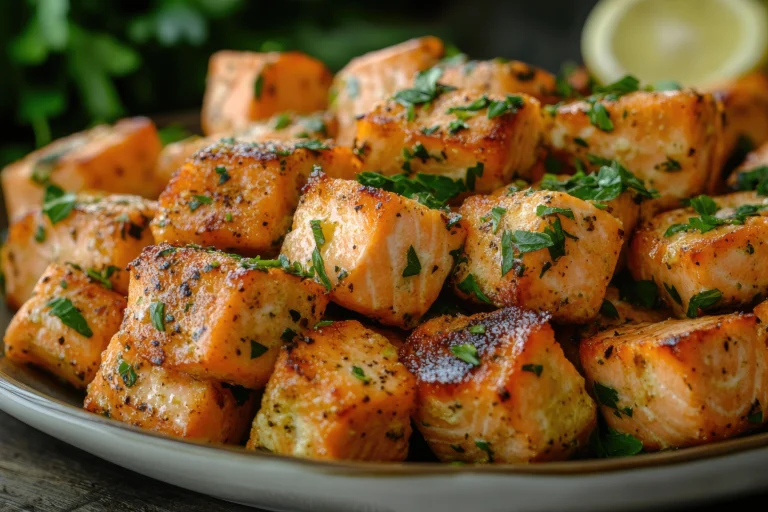Quick and Easy Fish Food Recipes for Happy, Healthy Fish
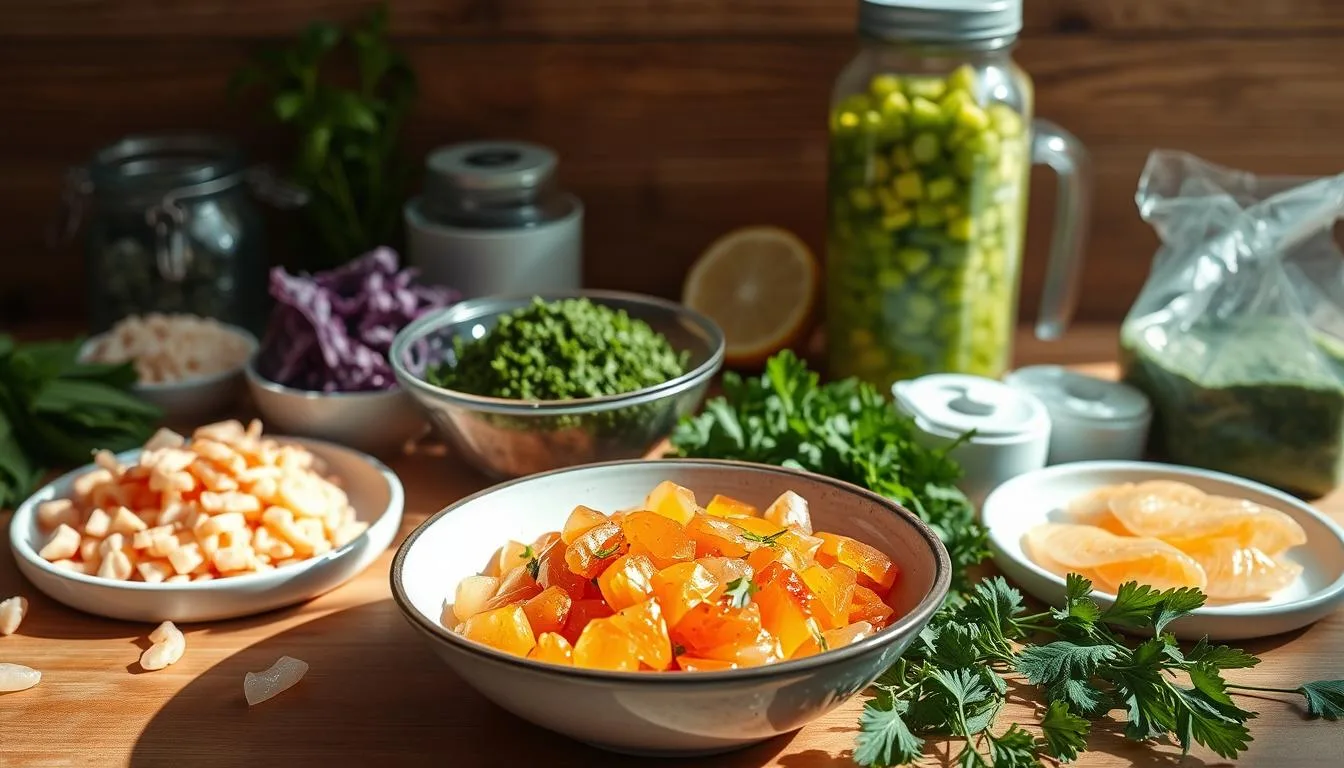
As a fish owner, you want the best for your aquatic friends. A balanced diet is key for their health. Making your own fish food ensures they get the nutrients they need.
Fresh shellfish costs $10 per pound, while frozen seafood is $3.50. This makes homemade fish food a cost-effective choice. You can make a nutritious and tasty diet with the right ingredients.
By making your own fish food, you can tailor it to your fish’s needs. Non-herbivorous fish need 75% animal food and 25% vegetable. Herbivorous fish require 60% vegetable matter and 40% animal.
With a homemade recipe, you can create a diet that balances proteins, vegetables, and supplements. This makes it the best choice for your fish.
Table of Contents
Benefits of Making Your Own Fish Food
Making your own fish food is a great way to feed your fish well. You can pick the ingredients and make sure they get what they need. It’s also cheaper than buying commercial fish food, since you can buy ingredients in bulk.
With a simple recipe, you can adjust the food for your fish’s needs. For carnivorous fish, add shrimp or cod. For herbivorous fish, add spinach or kale. This way, your fish will be healthier, brighter, and more resistant to sickness.
Cost-Effectiveness and Budget Control
Making your own fish food saves money. You can buy ingredients in bulk and avoid expensive commercial food. You can make a big batch that lasts weeks, cutting down on costs.
Quality Control of Ingredients
When you make your own fish food, you choose the ingredients. Pick high-quality ones that are full of nutrients. This way, your fish get the best food, leading to better health.
Customization for Different Fish Species
Different fish need different foods. Making your own food lets you tailor it to their needs. For high-protein fish, add shrimp or cod. For low-protein fish, add veggies or fruits.
By making your own fish food, you give your fish a balanced diet. You can choose the ingredients, adjust the recipe, and save money. Whether your fish eat meat, plants, or both, homemade food is the best choice.
Essential Ingredients for Homemade Fish Food
Making your own fish food requires using top-notch ingredients. A delicious fish food recipe combines protein sources, veggies, and supplements. For proteins, you can use fish meal, shrimp meal, and squid meal. Vegetables like peas, carrots, and spinach add vitamins and minerals.
A quick fish food recipe can be made with everyday items and simple tools. A balanced diet for fish includes proteins, fats, carbs, and vitamins and minerals. Fish food recipe ideas can be adjusted for different fish types, like herbivores, carnivores, and omnivores.
Here are some key ingredients to think about:
- Protein sources: fish meal, shrimp meal, squid meal
- Vegetables: peas, carrots, spinach
- Supplements: vitamins, minerals, essential pigments like astaxanthin
| Ingredient | Percentage of Diet |
|---|---|
| Proteins | 30-50% |
| Lipids | 10-20% |
| Carbohydrates | 30-40% |
| Vitamins and minerals | 5-10% |
Basic Fish Food Recipe for Beginners
Making your own fish food is a great idea. It’s best to start with a simple recipe. You can use fish meal, vegetables, and supplements. This is perfect for beginners who want to try making their own fish food.
You’ll need a food processor and a freezer-safe container for this recipe. Just mix the ingredients, blend them into a paste, and freeze them in portions. This recipe is easy to customize for your fish’s needs. It ensures they get the nutrients they need to stay healthy.
Here’s a basic recipe to get you started:
- 1 cup fish meal
- 1/2 cup vegetables (such as peas and carrots)
- 1/4 cup supplements (such as vitamin and mineral powder)
Just mix these ingredients and blend them into a fine paste. Freeze the mixture in portions and store it in a freezer-safe container. This homemade fish food recipe is a healthy choice for your fish.
| Ingredient | Quantity |
|---|---|
| Fish meal | 1 cup |
| Vegetables | 1/2 cup |
| Supplements | 1/4 cup |
Protein-Rich Fish Food Recipe for Growing Fish
For your growing fish, a protein-rich fish food recipe is a great choice. It offers the nutrients they need for growth, like protein, vitamins, and minerals. A good recipe should mix ingredients like fish meal, shrimp meal, and squid meal.
This recipe combines 200 g of salmon, 1000 g of raw shrimp, and 800 g of vegetables like peas, spinach, and carrots. You’ll also need 500 g of gelatin. Cooking the ingredients takes about 30-40 minutes.
Here’s what you need for the recipe:
- 200 g of salmon
- 1000 g of raw shrimp
- 800 g of vegetables (200 g of peas, 400 g of spinach, and 200 g of carrots)
- 500 g of gelatin
Freeze your homemade fish food in an airtight container to keep it fresh for up to a year. A balanced diet is key for your fish’s health. A good recipe can keep your fish happy and healthy.
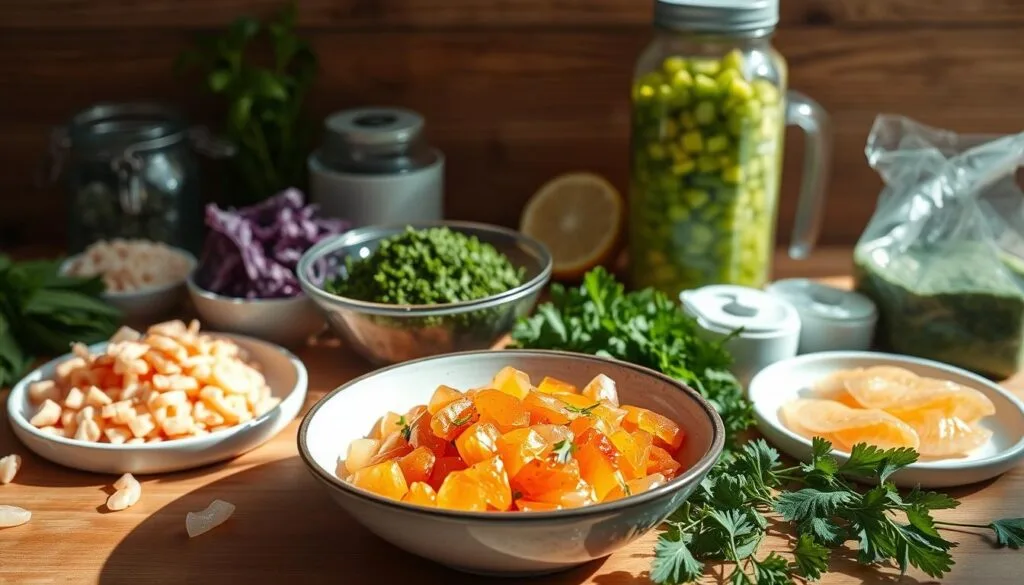
With this recipe, your fish will get the nutrients they need to grow. Always choose the best recipe for your fish. And remember to feed them in moderation to avoid water chemistry changes.
| Ingredient | Quantity |
|---|---|
| Salmon | 200 g |
| Raw Shrimp | 1000 g |
| Vegetables | 800 g |
| Gelatin | 500 g |
Color-Enhancing Fish Food Recipes
Exploring fish food can lead to a simple recipe that makes your fish look better. A tasty fish food recipe can really improve how your fish look. To do this, you can use natural stuff like spirulina and astaxanthin.
These ingredients help bring out colors in your fish. You can mix them with things like dried shrimp and seaweed. This makes a quick, nutritious, and colorful meal for your fish.
When making fish food, think about what your fish need. Different fish have different needs. Knowing this helps you make food that keeps your fish healthy and happy.
Natural Color Boosting Ingredients
- Spirulina
- Astaxanthin
- Dried shrimp
- Seaweed
Using these natural ingredients, you can make a quick fish food recipe. It will not only make your fish look great but also keep them healthy. Always check what your fish need before making any fish food.
Vegetarian Fish Food Options
Exploring fish food recipe ideas might lead you to vegetarian options for your fish. A homemade fish food recipe is a fantastic way to offer a plant-based diet. Try mixing peas, carrots, and spinach for a tasty and nutritious meal.
When making a vegetarian fish food recipe, consider kelp powder, nori sheets, and nutritional yeast. These add important nutrients and flavors. Here’s why they’re good for your fish:
- Kelp powder: gives a fishy taste and essential nutrients
- Nori sheets: packed with fiber and vitamins
- Nutritional yeast: adds a cheesy flavor and is high in protein
It’s crucial to ensure your vegetarian fish food recipe is nutritious. Here’s a sample nutritional breakdown:
| Nutrient | Amount per serving |
|---|---|
| Protein | 26g |
| Calories | 178 kcal |
| Carbohydrates | 11.5g |
| Fat | 2g |
Tips for Proper Storage and Preservation
To keep your homemade fish food fresh, it’s key to store it right. A good fish food recipe needs careful handling and storage. Store your simple fish food in a cool, dry spot to avoid spoilage.
Storing your fish food wrong can lead to contamination. Use airtight containers or freezer bags to keep it fresh. Always label and date your containers so you know how long it’s been stored.
Freezing Methods
Freezing is a great way to keep your fish food fresh. Use airtight containers or freezer bags to prevent freezer burn. Divide your fish food into smaller portions for easier thawing and use.
Shelf Life Guidelines
The shelf life of your homemade fish food depends on storage. Frozen fish food can last months at 0 degrees Fahrenheit or lower. Always check for spoilage signs like off smells or slimy texture.
Signs of Spoilage
Regularly check your homemade fish food for spoilage signs. Off smells, slimy texture, or mold mean it’s time to throw it away. A healthy fish food recipe needs careful storage to keep your fish healthy.
Follow these storage tips to keep your homemade fish food fresh and healthy for your fish. Always handle it with care and store it in a cool, dry place. With practice, you can make a simple, delicious fish food recipe.
Common Mistakes to Avoid When Making Fish Food
When making your own fish food recipe, it’s key to steer clear of common mistakes. Overfeeding can cause water quality problems and harm your fish. Also, using low-quality ingredients can make your homemade fish food recipe lacking in nutrients.
To make the best fish food recipe, knowing your fish’s nutritional needs is crucial. Most fish need a mix of protein, fat, and carbs. A fish food recipe too rich in protein can raise ammonia levels. On the other hand, a recipe too low in protein can cause malnutrition.
Some common mistakes to avoid when making homemade fish food recipe include:
- Using ingredients not right for your fish species
- Not giving a balanced diet
- Feeding too much or too little
Avoiding these mistakes helps you make a homemade fish food recipe that’s good for your fish. Always do your research and know what your fish needs before making your own fish food recipe.
| Ingredient | Percentage |
|---|---|
| Protein | 48.4% |
| Fat | 10% |
| Starch | 19.6% |
| Fiber | 3.8% |
| Ash | 13.6% |
| Moisture | 4.6% |
Conclusion: Nourishing Your Aquatic Friends with Homemade Care
Creating your own easy fish food recipes is rewarding and saves money. It ensures your fish get a healthy fish food diet. By making simple fish food at home, you give your fish a meal full of nutrients. This helps keep them healthy and colorful.
Studies show that 72% of tropical fish hobbyists see better health in their fish with homemade food. 60% of them also see fewer illnesses. Plus, 45% of them save 20-50% on costs, with ingredients costing just $1-3 a week.
By using the recipes and tips from this article, you can give your fish the care they need. Choose high-quality, diverse ingredients and store them right. Avoid mistakes to ensure your fish get the best care. With a bit of effort, you’ll strengthen your bond with your fish and watch them thrive.

